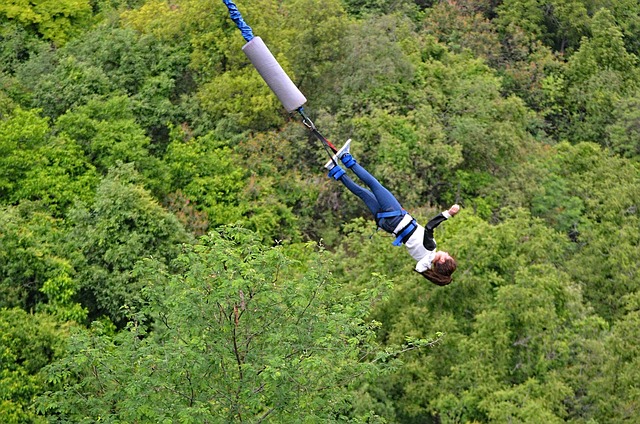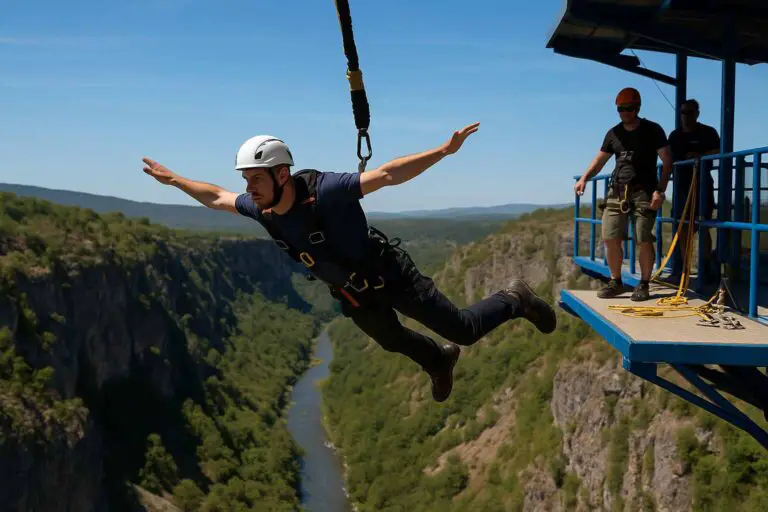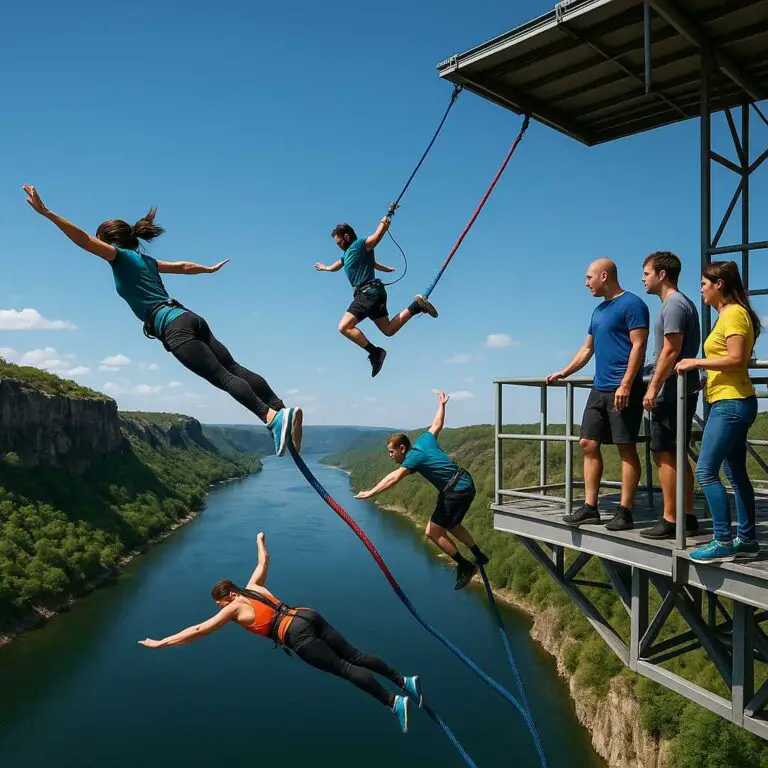Are you ready to experience the heart-pounding rush of bungee jumping? Bungee jumping undoubtedly offers an unparalleled adrenaline rush and an opportunity to conquer your fears as not many adventures do. But, before you go plunging headfirst into this gravity-defying escapade, it’s crucial to understand that bungee jumping is not for everyone. Safety should always come first, and knowing who should avoid bungee jumping is of utmost importance.
Individuals with certain health conditions, including cardiovascular issues, joint or bone problems, high blood pressure, respiratory conditions, neurological disorders, anxiety or panic disorders, and pregnant women should not do bungee jumping. Age and weight restrictions also apply.
But there’s more. In this article, I’ll take you on a journey through the various factors that can impact your suitability for this extreme sport. Keep reading!
I first must admit, that I’m no stranger to the world of bungee jumping myself, and I want to ensure that all fellow thrill-seekers make informed decisions. Whether you’re an adventure junkie looking to satisfy your adrenaline cravings or just curious about the risks involved, let’s dive into the nitty-gritty details of who should steer clear of bungee jumping to keep themselves safe and sound. Let’s get started!
Understanding the Basics of Bungee Jumping
Alright, let’s start at the very beginning – understanding what bungee jumping is all about. Bungee jumping is an extreme sport that involves jumping from a tall structure, such as a bridge or a platform, while attached to a long elastic cord. This cord is designed to stretch and then bounce back, preventing jumpers from hitting the ground with a sudden jolt.
The History and Evolution of Bungee Jumping: Bungee jumping has a fascinating history that traces back centuries. It’s believed to have originated from the land divers of Pentecost Island in the South Pacific, who would leap from wooden platforms with vines tied to their ankles as a ritual to ensure a good harvest. This daring practice eventually caught the attention of modern adventurers and led to the creation of the bungee jumping we know today.
The sport gained global popularity in the 1970s when a group of thrill-seekers from England’s Oxford University formed the “Dangerous Sports Club” and performed some of the earliest recorded bungee jumps from bridges and other tall structures.
Popular Bungee Jumping Locations Around the World
Bungee jumping has taken the world by storm, and you can find thrilling jump sites in numerous countries. Some iconic locations that attract adrenaline junkies from all corners of the globe include:
- Queenstown, New Zealand: Often considered the birthplace of commercial bungee jumping, Queenstown offers stunning landscapes and a variety of jump options.
- Victoria Falls Bridge, Zambia/Zimbabwe: Imagine plunging towards the mighty Victoria Falls, one of the world’s largest waterfalls.
- Verzasca Dam, Switzerland: Featured in a famous movie, this picturesque jump spot promises a breathtaking experience.
- Macau Tower, China: For those seeking an urban adrenaline rush, leaping from the Macau Tower is an extraordinary option.
Remember, each jump location has its unique charm and challenges, so it’s essential to choose a reputable operator and follow safety guidelines at all times.
Bungee jumping is undoubtedly an exhilarating experience that pushes the boundaries of adventure. However, before we get carried away by the excitement, it’s crucial to understand who should proceed with caution or avoid bungee jumping altogether. In the next section, I’ll explore the impact of physical health on bungee jumping and learn why it’s essential to listen to our bodies before taking the plunge.
The Physical Health Considerations
Bungee jumping is undoubtedly a thrilling adventure, but it’s not without its physical demands. Before you gear up for that leap, let’s take a moment to consider the impact of your physical health on bungee jumping.
Cardiovascular Health
Is Your Heart Ready for the Adrenaline Rush? Jumping off a towering platform can trigger an intense adrenaline rush, which can significantly elevate your heart rate. If you have a history of heart problems or cardiovascular conditions, such as high blood pressure, heart disease, or a recent heart attack, bungee jumping might not be suitable for you. The extreme stress placed on your heart during the jump could pose serious risks.
Joint and Bone Health
Impact on Bungee Jumping Bungee jumping involves a sudden jolt when the elastic cord reaches its maximum stretch and propels you back up. This impact can put strain on your joints and bones, especially your ankles and knees. If you have a history of joint problems, arthritis, or bone-related issues, it’s essential to consult with a medical professional before attempting a jump.
High Blood Pressure and Bungee Jumping
A Risky Combination High blood pressure can lead to various health complications, and the intense rush experienced during bungee jumping can further elevate your blood pressure levels. If you have hypertension, it’s crucial to take extra precautions and seek medical advice before participating in this extreme sport.
Respiratory Conditions
Precautions for Those with Breathing Issues Bungee jumping takes place in the great outdoors, and the excitement might leave you breathless even before the leap. If you have asthma or other respiratory conditions, consider how the sudden rush of air during the jump could affect your breathing. It’s best to discuss your plans with your healthcare provider to ensure your safety.
Neurological Conditions
When Should You Say No to Bungee Jumping? Certain neurological conditions may affect your ability to bungee jump safely. Conditions such as epilepsy, seizures, or any neurological disorder that affects your balance and coordination could put you at risk during the jump. Always consult with your neurologist to determine if bungee jumping is a safe choice for you.
Your physical health is a vital factor in deciding whether to take on the thrilling challenge of bungee jumping. It’s essential, to be honest with yourself and prioritize your well-being above all else.
So, let’s embrace the mental side of bungee jumping and explore how it might not be suitable for everyone.
Psychological Factors and Bungee Jumping
Bungee jumping isn’t just about the physical aspects; it’s also a test of mental strength and fearlessness. Before you take the plunge, let’s dive into the psychological factors that can impact your readiness for this thrilling adventure.
Fear of Heights
Conquering Acrophobia Before Taking the Leap Acrophobia, or the fear of heights, is one of the most common reasons why people avoid bungee jumping. While the idea of jumping off a high platform might seem daunting, it’s essential to assess your fear level realistically. If you have an extreme fear of heights, bungee jumping might not be the best choice for you. However, for some, bungee jumping can serve as an empowering way to conquer this fear. It all depends on your individual comfort and confidence levels.
Mental Health Conditions
Understanding the Risks Individuals with certain mental health conditions should approach bungee jumping with caution. Conditions such as anxiety disorders, panic attacks, or other mental health challenges can be triggered by the intense emotional experience of bungee jumping. If you are currently managing a mental health condition, it’s essential to discuss your plans with a mental health professional to ensure that the activity won’t exacerbate your condition.
Anxiety and Panic Disorders
How They Affect Your Jump Bungee jumping can evoke a mix of emotions, including excitement, fear, and adrenaline. For those with anxiety or panic disorders, this rollercoaster of emotions might be overwhelming. It’s crucial to consider how your anxiety might manifest during the jump and the potential risks associated with it. Always prioritize your well-being and consult with a mental health expert before attempting bungee jumping.
The mental aspect of bungee jumping is as important as the physical one. Being mentally prepared and confident can enhance your overall experience. However, if you find that certain psychological factors might hinder your enjoyment or safety, it’s okay to opt for alternative activities that align better with your comfort level.
Next, I’ll discuss specific age and weight restrictions related to bungee jumping. Age isn’t just a number when it comes to extreme sports, and it’s vital to know if bungee jumping is suitable for everyone, regardless of their age or body weight.
Age and Weight Restrictions
Bungee jumping is an exhilarating activity that attracts people of all ages, but there are certain age and weight restrictions in place to ensure safety and enjoyment for everyone involved. Let’s take a closer look at these considerations:
Age Limits: Is Bungee Jumping Suitable for Everyone? While bungee jumping is open to people of varying ages, there is typically a minimum age requirement set by operators to ensure that participants can fully comprehend the risks and follow safety instructions. The minimum age for bungee jumping can vary depending on the location and operator, but it often ranges from 12 to 18 years old. Younger participants may not have the emotional maturity to handle the experience or understand the importance of safety measures fully.
Weight Restrictions: Safety and Equipment Considerations Weight restrictions are crucial for maintaining the integrity of the bungee cord and ensuring a safe jump. Operators set weight limits based on the strength and elasticity of the cord used for each jump. Exceeding the specified weight limit could lead to an increased risk of injury or equipment failure.
It’s essential, to be honest about your weight and follow the guidelines set by the bungee jumping operator. Some operators might have different cord options to accommodate different weight ranges, but safety is always the top priority.
Always remember that bungee jumping is an extreme sport that places stress on your body, so it’s crucial to be within the specified weight range and age limit to ensure a safe and enjoyable experience.
In the following section, I’ll explore the impact of pregnancy on bungee jumping and the precautions that expectant mothers should take. Safety and well-being are paramount, especially during pregnancy, so let’s learn about the considerations for pregnant women and bungee jumping.
Pregnancy and Bungee Jumping
If you’re pregnant, congratulations on the exciting journey of pregnancy! However, when it comes to extreme sports like bungee jumping, it’s crucial to prioritize the health and safety of both the expectant mother and the baby. Let’s explore why bungee jumping and pregnancy don’t mix well:
Pregnancy and Extreme Sports: The Need for Caution During pregnancy, your body goes through significant changes to accommodate the growing baby. Participating in extreme activities like bungee jumping can expose both you and your baby to potential risks. The sudden and intense jolts experienced during bungee jumping could place excessive stress on your body, which isn’t suitable for a developing pregnancy.
Potential Risks to the Baby and Mother: Bungee jumping involves sudden deceleration and acceleration, which can affect the placenta’s stability and blood flow to the baby. This could lead to complications or put both the mother and the baby at risk. Additionally, there’s a possibility of the harness or cord putting pressure on the abdomen, which is not safe during pregnancy.
It’s crucial to prioritize the well-being of your baby during this special time. Avoiding bungee jumping and other high-risk activities is essential to ensure a healthy and safe pregnancy.
While you might be eager to experience new adventures, it’s best to explore other thrilling activities that are safe for expectant mothers. Your healthcare provider can guide you on suitable exercises and activities that promote a healthy pregnancy without compromising your baby’s well-being.
Let’s discuss the impact of specific medical conditions on bungee jumping. Your health is a top priority, and understanding how certain medical conditions can affect your ability to bungee jump safely is essential.
Medical Conditions and Bungee Jumping
Before taking the plunge into the world of bungee jumping, it’s crucial to consider how certain medical conditions can impact your ability to participate safely. Let’s explore the potential risks and precautions for specific medical conditions:
Epilepsy and Seizure Disorders: A No-Go for Bungee Jumping If you have a history of epilepsy or seizure disorders, bungee jumping is not recommended. The sudden jerks and movements during the jump could trigger a seizure, putting you at risk and jeopardizing the safety of those around you. It’s best to avoid this high-intensity sport to protect your well-being.
Back and Neck Issues: Protecting Your Spine Bungee jumping involves significant forces acting on your body, particularly on your spine. If you have a history of back or neck problems, such as herniated discs, spinal injuries, or chronic pain, participating in bungee jumping could exacerbate these issues. The impact from the jump might put unnecessary strain on your spine, potentially leading to further injuries.
Recent Surgeries: Why You Should Wait Before Bungee Jumping If you’ve undergone recent surgeries, especially those related to your musculoskeletal system, it’s essential to avoid bungee jumping until you have fully recovered and received clearance from your doctor. Healing tissues and stitches may not withstand the stresses of bungee jumping, putting you at risk of reopening wounds or causing complications.
While some medical conditions might make bungee jumping unsuitable, there are plenty of other ways to embrace adventure safely. Always consult with your healthcare provider to assess your individual health status and determine if you are fit for extreme activities like bungee jumping.
In the next section, I’ll discuss specific precautions for people with certain health conditions, such as diabetes and asthma, to ensure they can enjoy thrilling experiences while staying safe.
Precautions for People with Specific Health Conditions
Adventure knows no bounds, and with proper precautions, individuals with certain health conditions can still enjoy thrilling experiences like bungee jumping. Let’s explore the specific precautions for people with particular health conditions:
Diabetes and Bungee Jumping: Managing Blood Sugar Levels For individuals with diabetes, managing blood sugar levels during an adrenaline-pumping activity like bungee jumping is essential. The intense physical and emotional experience can impact blood glucose levels. Before the jump, ensure your blood sugar is stable and within a safe range. Always carry appropriate snacks or glucose supplements with you to manage any fluctuations during the activity.
Asthma and Allergies: Safety Measures for Jumpers If you have asthma or allergies, take necessary precautions before attempting a bungee jump. Ensure you have your inhaler or prescribed medications on hand and inform the jump operator about your condition. Choose a day and location with favorable weather conditions to minimize potential triggers.
Remember, communication is key! Inform the bungee jumping operator about your health condition so they can provide appropriate guidance and support throughout the experience.
Regardless of your health condition, it’s essential to have a detailed discussion with your healthcare provider before embarking on any extreme adventure. They can assess your specific situation and provide personalized advice to ensure you have a safe and enjoyable experience.
Next, I’ll emphasize the importance of qualified operators and regular safety checks when it comes to bungee jumping.
Bungee Jumping and Medications
If you’re considering bungee jumping and currently taking medications, it’s essential to be aware of how these drugs might interact with the adrenaline-pumping experience. Let’s dive into the impact of medications on bungee jumping:
Prescription Drugs: Understanding the Implications Certain prescription medications may affect your body’s response to the intense physical and emotional stress of bungee jumping. Medications for conditions such as high blood pressure, heart conditions, or anxiety may influence your heart rate, blood pressure, or overall stability during the jump. Always consult with your healthcare provider about your intention to bungee jump, and they can assess the safety of your medications in this context.
Over-the-Counter Medications: Potential Interactions Even seemingly harmless over-the-counter medications can have implications during an extreme activity like bungee jumping. Allergy medications, pain relievers, or cold remedies may cause drowsiness or other side effects that can impact your judgment and coordination during the jump. Read the labels carefully and, if in doubt, consult with your healthcare provider.
Always inform the bungee jumping operator about any medications you are taking before the jump. Their expertise and knowledge can help ensure your safety and provide any necessary accommodations.
Your health and well-being should always take precedence, so it’s essential to have open and honest communication with your healthcare provider before attempting any extreme sport.
Let’s highlight the importance of choosing a reputable bungee jumping operator and understanding the significance of regular safety checks. Adventure should be exhilarating, but above all, it must be safe.
The Importance of Qualified Operators and Safety Checks
When it comes to bungee jumping, your safety hinges on the expertise of the operators and the rigorous adherence to safety standards. Let’s delve into why choosing a reputable bungee jumping operator and ensuring regular safety checks are paramount:
Choosing a Reputable Bungee Jumping Operator: Before taking the leap, thoroughly research and choose a bungee jumping operator with a proven track record of safety and professionalism. Look for reviews and testimonials from previous jumpers to gauge their experiences. A reputable operator will prioritize your safety, provide clear instructions, and have well-maintained equipment.
Safety Equipment and Regular Inspections: Top-notch safety equipment is the foundation of a secure bungee jumping experience. This includes harnesses, cords, and other gear designed to handle the intense forces of the jump. Ensure that all equipment meets industry standards and is routinely inspected and maintained by qualified professionals.
Regular safety checks are crucial to identify any potential issues and prevent accidents. Reputable operators will conduct thorough inspections of their equipment, jump sites, and safety procedures regularly to ensure everything is in perfect working order.
Recommended Products
Here are some top recommended products to ensure your safety and capture your thrilling moments.
Health Monitoring Devices
- Omron Platinum Blood Pressure Monitor: Keep your blood pressure in check with this accurate and easy-to-use monitor. It’s essential for ensuring you’re physically ready for the jump.
- Fitbit Charge 4 Fitness and Activity Tracker: Track your heart rate and physical activity to ensure you’re fit for extreme sports. This tracker provides real-time data on your physical condition.
- AliveCor KardiaMobile Personal EKG: Monitor your heart health with this portable EKG device. It’s a handy tool for those with cardiovascular concerns.
Bungee Jumping Equipment
- GoPro HERO10 Black Action Camera: Capture your thrilling jump with this high-quality action camera. Its advanced stabilization ensures clear and steady footage, perfect for reliving the experience.
- Bungee Jumping Cord Kit: Ensure you have the best quality cord for your jump. This kit is designed for durability and safety, providing peace of mind as you take the plunge.
- Full Body Safety Harness: A reliable harness that fits well and provides maximum security is crucial for a safe jump. This harness is adjustable and comfortable, ensuring a snug fit.
- Adjustable Ankle Straps: High-quality ankle straps are essential for a safe jump. These straps are durable and designed to handle the intense forces of bungee jumping.
Conclusion
In conclusion, the best answer to “who should not do bungee jumping” are individuals with specific health conditions or those who fall within certain risk categories. These may include individuals with cardiovascular issues, joint or bone problems, high blood pressure, respiratory conditions, neurological disorders, anxiety, or panic disorders. Pregnant women should also avoid bungee jumping due to potential risks to the baby and mother.
Additionally, age and weight restrictions are in place for safety reasons. Young children who may not fully comprehend the risks involved and individuals who exceed the specified weight limits should refrain from bungee jumping.
It’s crucial to consult with healthcare professionals and be honest about your health status before attempting bungee jumping. They can provide personalized advice and ensure your safety during this extreme adventure.
While bungee jumping can be an awe-inspiring and memorable experience, always remember to prioritize your well-being above all else. There are plenty of other exciting activities to embrace safely, so don’t hesitate to explore alternatives if bungee jumping isn’t a suitable choice for you.
In the end, your journey into the world of adventure should be a thrilling and responsible one. Whether you’re soaring above breathtaking landscapes or challenging your fears in an urban setting, make sure to savor the experience and cherish every moment. Stay safe, have fun, and remember that the best adventure is the one taken with both excitement and caution.
Check my latest article: Bungee Jumping Exercise: Adrenaline-Fueled Workouts








